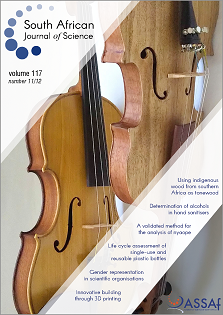The polyphagous shot hole borer beetle: Current status of a perfect invader in South Africa
DOI:
https://doi.org/10.17159/sajs.2021/9736Keywords:
distribution, Euwallacea fornicatus, Fusarium euwallaceae, host range, invasion biologyAbstract
The polyphagous shot hole borer (PSHB) beetle is a recent invader in South Africa. Together with its fungal symbiont, Fusarium euwallaceae, it can rapidly kill highly susceptible host plants. Its impact is most profound in urban areas, but it has also been found infesting important forestry, agricultural crop and native species. Since its first detection in 2012, PSHB has spread to all but one province in the country. The beetle–fungus complex has several biological traits that enhance its anthropogenically mediated dispersal, establishment and survival in novel environments – factors that have likely facilitated its rapid spread across the country. We review the history of the PSHB invasion in South Africa, its taxonomic status and the reasons for its rapid spread. We highlight its potential impact and challenges for its management. Finally, we provide an updated distribution map and list of confirmed host plants in South Africa. Of the 130 plant species identified as hosts, 48 of these (19 indigenous and 29 introduced) are reproductive hosts able to maintain breeding PSHB populations. These reproductive hosts may succumb to beetle infestations and act as ‘pest-amplifiers’. The economic impact on urban forests, plantation forestry and agricultural crops may be severe, but the ecological impact of PSHB invasion in native ecosystems should not be underestimated.
Significance:
- We provide an updated host list and distribution map for South Africa of the globally significant tree pest, the polyphagous shot hole borer (PSHB, Euwallacea fornicatus). The South African PSHB invasion represents the largest outbreak of this pest in its global invaded range. PSHB was confirmed to infest 130 plant species in urban, agricultural, and native ecosystems in South Africa, including 44 previously unreported hosts. Impact in South Africa is in its infancy but will likely be substantial to local economies and ecosystems. Mitigation has proven difficult, but numerous research projects have been initiated throughout the country.
Published
Issue
Section
License

All articles are published under a Creative Commons Attribution 4.0 International Licence
Copyright is retained by the authors. Readers are welcome to reproduce, share and adapt the content without permission provided the source is attributed.
Disclaimer: The publisher and editors accept no responsibility for statements made by the authors
How to Cite
- Abstract 2772
- PDF 2482
- EPUB 267
- XML 273













.png)